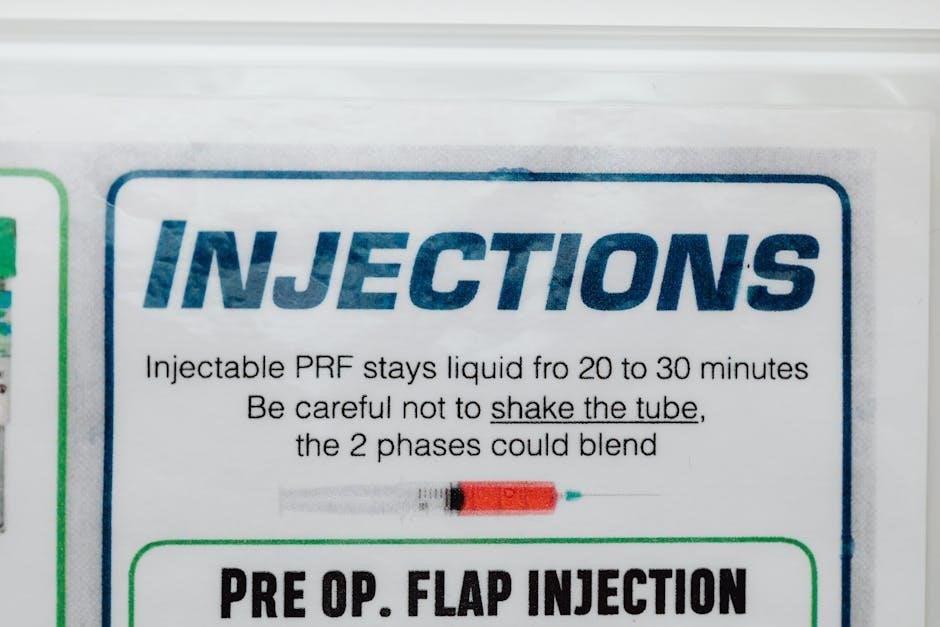NJ-CBT (New Jersey Corporation Business Tax) is a tax imposed on corporations operating in New Jersey․ These instructions guide businesses on filing, forms, and compliance requirements effectively․
What is NJ-CBT?
NJ-CBT stands for New Jersey Corporation Business Tax, an annual tax imposed on corporations operating in New Jersey․ It applies to both domestic and foreign corporations conducting business within the state․ The tax is based on the corporation’s net income and net worth, with rates ranging from 6․5% to 8․85%․ A surtax may also apply for certain income levels․ The NJ-CBT aims to ensure businesses contribute to state revenue, funding public services and infrastructure․ Corporations must file Form CBT-100 to report their taxable income and calculate their liability․
Importance of NJ-CBT for Businesses
NJ-CBT is crucial for businesses as it ensures compliance with state tax regulations․ It requires corporations to report income accurately, contributing to New Jersey’s revenue․ Proper filing helps businesses avoid penalties and maintain legal standing․ Understanding NJ-CBT is essential for tax planning and financial management, ensuring businesses meet their obligations efficiently․ Compliance fosters trust and stability, enabling companies to operate smoothly within the state․ Accurate reporting also supports public services funded by tax revenues, benefiting the business environment and community․

Filing Requirements for NJ-CBT
Businesses must meet specific eligibility criteria and adhere to deadlines for submitting accurate returns․ Electronic filing is mandatory, ensuring compliance and avoiding penalties․ Proper documentation is essential․
Eligibility Criteria for Filing NJ-CBT
Eligibility for filing NJ-CBT applies to corporations and certain partnerships operating in New Jersey․ Businesses must meet specific income thresholds or have nexus in the state․ Foreign corporations with ownership in New Jersey partnerships are also required to file․ S corporations must use Form CBT-100S, while combined groups may need to file Form CBT-100U․ The criteria ensure compliance with state tax regulations and proper reporting of business activities․
Deadlines and Timelines for Submission
The standard deadline for submitting NJ-CBT returns is April 15th for calendar-year corporations․ Extensions may be granted, but taxes must still be paid by the original due date․ Electronic filing is mandatory, and payments must be made through approved online systems․ The New Jersey Division of Taxation provides a paperless submission process, offering confirmation upon successful filing․ Timely compliance is crucial to avoid penalties and ensure proper tax reporting․
Mandatory Electronic Filing
All NJ-CBT returns, including Form CBT-100, must be filed electronically through the New Jersey Division of Taxation’s online system․ Electronic filing ensures accuracy and faster processing․ Payments must also be made electronically, and a confirmation number is provided upon successful submission․ This method eliminates paper-based errors and streamlines the process․ Businesses are required to register and set up an account on the state’s tax portal to comply with this mandate․ Failure to file electronically may result in penalties and delays in processing․

Forms and Schedules for NJ-CBT
Key forms include CBT-100 for general returns, CBT-100S for S corporations, and CBT-100U for unitary returns․ Each serves distinct purposes, ensuring accurate tax reporting and compliance․
These forms must be submitted electronically along with required schedules to complete the filing process successfully․
Form CBT-100: Overview and Purpose
Form CBT-100 is the primary form for New Jersey Corporation Business Tax filings․ It is used by corporations to report their taxable income, deductions, and credits․
The form calculates the tax liability based on the tax base and applicable rates․ Corporations must include Schedule A to detail income and deductions․
Accurate completion ensures compliance with state tax regulations, avoiding penalties․ Electronic filing is mandatory for all submissions․
Form CBT-100S: Specific Requirements
Form CBT-100S is specifically designed for New Jersey S corporations to report their income, deductions, and credits․ It is used to calculate the tax liability for S corporations operating in the state․ The form requires detailed reporting of income from Schedule A and must be accompanied by supporting schedules․ S corporations must ensure all shareholders’ information is accurately included․ Electronic filing is mandatory, and the form must be submitted along with the required documentation to avoid penalties․ Compliance with specific instructions is essential for accurate tax reporting․
Form CBT-100U: Unitary Return Details
Form CBT-100U is used by corporations filing a unitary return, combining the income of all members within the corporate group․ It ensures consistent reporting of income, deductions, and credits across the unitary business․ The form requires detailed financial statements and must be submitted electronically․ Corporations must meet specific eligibility criteria to file as a unitary group․ Accurate completion of this form is crucial for compliance with New Jersey tax regulations and to avoid penalties․ Proper documentation and adherence to filing deadlines are essential for a smooth process․

Tax Calculation and Payment
Tax calculation involves determining the taxable income and applying the appropriate rate․ Payments must be made electronically, with penalties for late submissions․ Ensure accurate filings to avoid issues․
Determining the Tax Base
The tax base for NJ-CBT is calculated using Schedule A, Part III․ It includes taxable income adjusted for specific items like exemptions, deductions, and exclusions․ Businesses must ensure all income is properly reported and aligned with federal taxable income, with adjustments for state-specific rules․ The tax base determination is critical for accurate tax calculations and compliance․ Review federal returns and state adjustments carefully to ensure correctness․ This step is foundational for applying the correct tax rates and avoiding penalties․
Applying the Applicable Tax Rate
After determining the tax base, apply the applicable tax rate to calculate the corporation’s tax liability․ The tax rate varies based on taxable income levels․ For example, lower income brackets may qualify for a reduced rate, while higher incomes face standard rates․ Multiply the tax base by the applicable rate from the tax bracket schedule․ Ensure to account for any surtaxes or additional taxes, such as those applied to high-income corporations․ Accurate application of the tax rate ensures compliance and avoids penalties․ Always refer to the latest tax rate schedules for precise calculations․
Understanding Surtax and Additional Taxes
Surtax and additional taxes are supplementary charges applied to the corporation’s tax liability․ A surtax of 2․5% is imposed on corporations with taxable incomes exceeding $1 million․ Additional taxes may include the Alternative Minimum Assessment Tax (AMT) or the Branches or Agencies Tax for foreign corporations․ These taxes are calculated separately and added to the base tax․ Ensure to review the specific thresholds and rates, as they may change annually․ Accurate calculation of these taxes is essential to avoid penalties and ensure full compliance with state regulations․

Electronic Filing Procedures
NJ-CBT requires mandatory electronic filing through the Division of Taxation’s File Online service․ This paperless process provides a confirmation number upon submission, ensuring efficient compliance and record-keeping․
Registration and Setup
To begin electronic filing for NJ-CBT, businesses must register with the New Jersey Division of Taxation’s online service․ Create an account, providing required credentials such as business details and tax identifiers․ Ensure all necessary documents, like EIN and business registration proof, are readily available․ Once registered, obtain login credentials for secure access․ This step is essential for submitting forms and payments efficiently․ Remember to maintain accurate and updated information to avoid filing delays or errors․
Required Documentation
Ensure you have all necessary documents before filing NJ-CBT․ This includes a completed Form CBT-100, supporting schedules, and copies of federal tax returns․ Attach relevant extracts from federal filings, such as income statements and balance sheets․ For specific cases, include Form CBT-100S for S corporations or Form CBT-100U for unitary groups․ Additionally, provide documentation for any claimed deductions, credits, or adjustments․ Accurate and complete records are essential for a smooth filing process and to avoid potential delays or audits․
Submission and Confirmation
Once all documentation is prepared, submit the NJ-CBT return electronically through the New Jersey Division of Taxation’s online portal․ Ensure all forms, including CBT-100, CBT-100S, or CBT-100U, are accurately completed․ After submission, you will receive a confirmation number, which serves as proof of filing․ Retain this number for your records․ The system will validate your submission instantly, and any errors will be highlighted for correction․ A confirmation email may also be sent to acknowledge successful filing․ Keep all records for audit purposes․

Payments and Penalties
Payment Methods and Options
Electronic payments are mandatory for NJ-CBT․ Businesses can use E-Check, ACH debit, or credit card payments through the New Jersey Division of Taxation’s online portal․ Ensure timely payments to avoid penalties․ ACH payments are preferred for large amounts, while credit cards may incur convenience fees․ Payments must be submitted by the deadline to prevent late fees and interest․ Confirm payment confirmation numbers for records․ Failure to pay on time results in penalties and accrued interest․
Consequences of Late Payments

Failure to pay NJ-CBT on time results in penalties and interest․ A 5% penalty applies to unpaid taxes, plus 0․5% monthly interest until paid․ If payment is not made within 21 days of the due date, an additional 5% penalty is imposed․ Late payments can also lead to loss of refund claims and potential legal actions․ Businesses must prioritize timely payments to avoid financial and administrative consequences․ Always confirm payment deadlines to ensure compliance and prevent additional charges․ Late payments can significantly increase tax liabilities over time․

Credits and Deductions
Businesses can reduce their tax liability through available credits and deductions․ These are claimed on specific forms and schedules, ensuring compliance with state tax guidelines․
Available Credits for NJ-CBT
Businesses can claim various credits to reduce their NJ-CBT liability․ These include the Business Employment Incentive Program (BEIP) credit and Urban Enterprise Zone (UEZ) credits․ Additionally, corporations may benefit from research and development tax credits for qualified activities․ These credits are claimed on specific forms and schedules, ensuring compliance with state regulations․ They provide financial incentives for businesses to promote economic growth and job creation in New Jersey․
Claiming Deductions
Claiming deductions under NJ-CBT involves identifying eligible expenses that reduce taxable income․ Common deductions include operating losses, interest expenses, and certain business-related costs․ Businesses must itemize these deductions on the appropriate schedules and forms․ Proper documentation and adherence to state guidelines are essential to ensure compliance․ Corporations should consult official resources or tax professionals to accurately claim deductions and optimize their tax obligations under New Jersey law․

Additional Resources and Support
Access official New Jersey tax resources, professional assistance, and online tools for guidance on NJ-CBT filing, ensuring compliance and accurate submissions․
Official State Resources
The New Jersey Division of Taxation provides comprehensive resources for NJ-CBT, including detailed instructions, downloadable forms like CBT-100 and CBT-100S, and electronic filing guidelines․ Visit their official website for up-to-date information, FAQs, and tax calculation tools․ Additionally, the state offers a paperless filing system, ensuring a seamless and efficient submission process with instant confirmation for accurate compliance․
Professional Assistance
Consulting tax professionals or legal experts is highly recommended for navigating NJ-CBT complexities․ Certified public accountants and tax attorneys can provide tailored guidance, ensuring compliance with state regulations․ Additionally, professional services offer support with form preparation, tax calculations, and audit representation․ Utilizing specialized software or advisory firms can streamline the filing process and minimize errors․ Professional assistance is particularly beneficial for complex scenarios, such as unitary returns or surtax calculations, ensuring accurate submissions and optimal tax planning․

